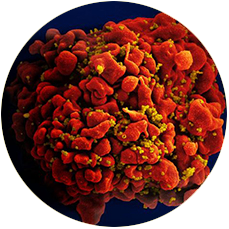 Overview/Mission
Overview/Mission
MPIDB supports domestic and international research, as well as research training and career development programs related to the epidemiology, diagnosis, clinical manifestations, pathogenesis, transmission, treatment, and prevention of HIV and its complications in infants, children, adolescents, pregnant people, and women. As the HIV epidemic has evolved and other infectious diseases have emerged in the United States and globally, the branch has ensured that its funded research reflects these changes and addresses important opportunities and gaps as they arise, including HIV-associated co-infections such as tuberculosis (TB), hepatitis, and malaria.
To meet the needs and ongoing challenges of other significant infectious diseases, MPIDB coordinates research on the epidemiology, natural history, pathogenesis, transmission, treatment, and prevention of congenital infections, such as Zika virus and cytomegalovirus; emerging infectious diseases, such as COVID-19; and vaccine-preventable disease in infants, children, adolescents, and women.
Congruent with the branch’s mission, MPIDB supports a number of research programs and networks to improve health outcomes among populations of interest. Two major priorities for branch-funded clinical research networks are: HIV (and TB) therapeutics in infants, children, adolescents, and pregnant people; and epidemiologic research in individuals living with HIV or at risk for HIV, including infants, children, adolescents, and young adults who were exposed to HIV in utero.
Highlights
- Get to Know NICHD! Learn more about what inspired MPIDB Chief Dr. Sonia Lee and Public Health Analyst Samantha Calabrese to pursue science and how their decisions and experiences led them to their careers with NICHD.
- MPIDB leads and participates in many activities for NICHD related to COVID-19 research in children, during pregnancy and postpartum, and with underserved populations. Learn more on the COVID-19 Research and NICHD website.
- Predicting Viral-Associated Inflammatory Disease Severity in Children with Laboratory Diagnostics and Artificial Intelligence
(PreVAIL kIds), is part of NIH’s Rapid Acceleration of Diagnostics initiative to speed innovation in the development, commercialization, and implementation of technologies for COVID-19 testing.
- Predicting Viral-Associated Inflammatory Disease Severity in Children with Laboratory Diagnostics and Artificial Intelligence
- News Release: NIH announces winners of data challenge to identify risk factors for first-time pregnancies. Awarded projects of the Decoding Maternal Morbidity Data Challenge seek to reduce pregnancy complications and prevent maternal deaths.
- Subscribe to the MPIDB newsletter
or read previous issues
in the newsletter archive.
 BACK TO TOP
BACK TO TOP